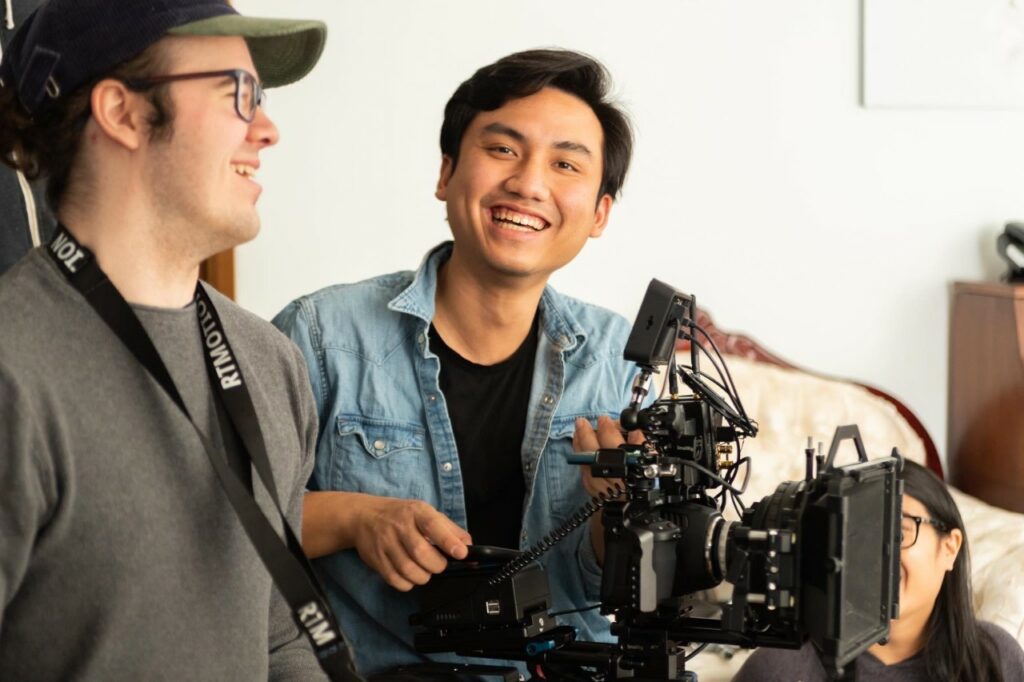
Quan Luong is the first to pursue a career in the arts in a family of engineers. But he has them to thank for exposing him to the power of pictures early in life.
His father always had a passion for photography, so Quan grew up around cameras. This gave him the chance to begin his filmmaking journey at the age of 13, making short films and YouTube videos with friends.
Today he works as a cinematographer and colourist on TV shows, documentaries, commercials, and independent films.
When and how did you start in the film and media production industry?
I got my start in professional videography in 2016 after moving to Canada from Vietnam to go to university. I produced event and corporate videos while working as a production assistant and camera assistant for Markus Henkel on a low budget feature. He would go on to become a great mentor for me.
In my first two years in film I worked at a small media company. I got to try my hand at all sort of projects from weddings to corporate videos to music videos. I even worked at Pizza Hotline as a videographer and photographer. These experiences taught me a lot about the technical side of being a shooter and editor, but I was always working as a one-man band. I realized that I wanted to collaborate with others.
In November 2018, I got a call from Markus to work with Farpoint Films as a colourist on a TV show called My Misdiagnosis. This got my foot in the door of the film industry — and changed my life.
Since then, I’ve coloured over 100 hours of TV and have also worked my way up from being electric to 2nd unit director of photography and online editor on Farpoint’s latest shows.
Over the last couple years, I’ve also been lucky enough to work with some other great Winnipeg-based organizations like FRANK Digital, Wookey Films, and Les Productions Rivard as a first camera assistant and camera operator.
What area of the film industry do you work in now and why?
Right now I’m working as an online editor, colourist, camera operator, and cinematography on multiple TV series, documentaries, commercials, and independent films.
Honestly, ever since I met Markus five years ago I knew I wanted to be a cinematographer. That’s why I’ve always tried to find work related to camera and lighting. I truly enjoy being on set no matter what position I’m doing in the camera and lighting departments.
The projects I enjoy working on the most are narrative and creative projects with my director friends Erin Hembrador and Ian Bawa. I get to be a collaborator, not just a DP, and be involved in all aspects of the project.
What has been a substantial change in the industry since you started?
I haven’t worked in the industry for too long but from what I’ve heard, things just keep getting more and more busy over the years, both with union and non-union projects. I think this helps younger people, especially newcomers to Canada like myself, find opportunities to get involved in the industry.
I have been around long enough to see a major boom in camera and lighting technology. High-quality equipment has become much more accessible in the past few years. Everyone can make good-looking images now without having a big camera/lighting package.
If you could give yourself past self advice, what would it be?
Don’t be impatient. Instead, learn to enjoy the process.
I used to beat myself up for not getting an opportunity to be the cinematographer on any project — but everything takes time and effort. The opportunity will eventually come if you’re passionate about learning and growing. Luckily for me, I was surrounded by talented and supportive friends who always had my back, and sometimes that meant defending me from myself when I’m being too hard on myself.
What is advice you would give to someone starting off in the media production industry?
Seek mentorship every step of the way.
I just think it’s the best way to learn. I’ve had some amazing mentors in the local industry and also through the Canadian Society of Cinematographers.
Why is learning and training important?
I see filmmaking as a lifestyle more than a job. That’s why I try my best to surround immerse myself in all aspects of the industry so I can learn and grow as much as possible. Winnipeg has so many amazing resources — like FTM, WFG and the amazing tax credit — so it’s a perfect place for filmmaking professionals.
What are some of the films, TV series or even books that have inspired you? How about anything new you’ve been into?
I loved big Hollywood films like La La Land, The Social Network, Arrival, and The Godfather when I was in university. Recently I’ve found myelf much more attracted to smaller and more intimate films like The Farewell, Nomadland, Room, and so on.
But more than anything, I’m inspired by the people I have personal and professional connections with — many of whom I call mentors. This includes people like Markus Henkel, Ian Bawa, Brad Crawford, and Maya Bankovic.
Is there something about you or an interesting past experience that you’d like to share?
I really love all the experiences that this career has brought me so far. Being so new to the city and country, film has allowed me to visit places, try things, and meet people that I would’ve never otherwise.
Who is someone within the film industry you would like to work with and why?
I’m really fascinated by Chloe Zhao’s vérité approach to filmmaking. She appreciates her collaborators and carefully hires everyone in the cast and crew to make sure she has a team who is passionate about the project.
I think collaboration is the most important part of filmmaking and much like Chloe, I want to be having fun with other people who are passionate about this art form.
Where do you see yourself ten years from now?
Hopefully I’ll be working full-time as a cinematographer, making movies and having fun with friends.
FTM is a member of the Province of Manitoba’s sector council program funded through the Department of Economic Development and Training. FTM builds a highly skilled and adaptable film industry workforce to support the activities of Manitoba production companies. FTM collaborates and partners with members of the film and television industry to identify training needs to support workforce development output.
